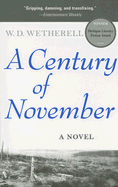
 "He judged men and he grew apples and it was a perilous autumn for both." With this marvelous opening line, W. D. Wetherell begins the story of Charles Marden's bleak journey to Belgium, to see the exact spot where his son Billy died in the last days of World War I. Marden lives on Vancouver Island, where he is a farmer and magistrate, and mourning the death of his wife in the Spanish flu epidemic. When he gets word of his son's death, he leaves the island and impulsively takes a train to Halifax, then buys passage on a ship to Southampton. He notes in his journal that his cabin is 9C, starboard side, "down low near the bow. The most vulnerable spot for torpedoes, they say. Which is fine with me." After landing in England, he travels to Salisbury where Billy was stationed, hoping to get more information about his death, and life. He obtains his son's records and hears that a young woman, Elaine Reed, had been there the previous day, asking the same questions. He discovers that she has left for London and then Belgium, and while "He was going to Flanders to bury hope," he wonders what she is seeking.
"He judged men and he grew apples and it was a perilous autumn for both." With this marvelous opening line, W. D. Wetherell begins the story of Charles Marden's bleak journey to Belgium, to see the exact spot where his son Billy died in the last days of World War I. Marden lives on Vancouver Island, where he is a farmer and magistrate, and mourning the death of his wife in the Spanish flu epidemic. When he gets word of his son's death, he leaves the island and impulsively takes a train to Halifax, then buys passage on a ship to Southampton. He notes in his journal that his cabin is 9C, starboard side, "down low near the bow. The most vulnerable spot for torpedoes, they say. Which is fine with me." After landing in England, he travels to Salisbury where Billy was stationed, hoping to get more information about his death, and life. He obtains his son's records and hears that a young woman, Elaine Reed, had been there the previous day, asking the same questions. He discovers that she has left for London and then Belgium, and while "He was going to Flanders to bury hope," he wonders what she is seeking.He crosses the channel to Europe, along with others who are making the journey, looking for loved ones, carrying tins of cocoa and extra clothing, because not one of them believes their son is dead. "We've come, we've all come, to warm them, feed them, fetch them home." In Ypres, "The destruction was so total it made it seem like we were children walking a long plank over an abyss." And so they are, navigating collapsed trench systems, lines of discarded tins, the British labels only sixty yards from the German. Thick belts of barbed wire, smashed culverts, shattered and seared trees, penny nails marking graves. Marden is still trying to catch up with Elaine Reed, who also is determined to find where Billy died. One night he spends in a crater, wrapped in a blanket, listening to shells detonating spontaneously around him: "Out over No Man's Land, triggered by who knew what, an unexploded flare became agitated enough to leave its casing and arc skyward, smearing its green against the underside of a cloud, cooling into a perfect yellow petal, drooping earthwards as below it, rising up on all sides, came the appreciative yipping of dogs."
Wetherell excels in description, using words with precision and solemn beauty. On Vancouver Island in July, fires from the mainland burned all summer, with no young men to fight them, "until each apple tree in the orchard was doubled by a spiky silhouette of gray," echoing the devastation of France. On the ship to Southampton, the passengers, pilgrims to the battlefields, filled their days with "solemn clockwise promenading, like skaters in a very grave waltz." At night, Marden hears a whining sound in the very steel of the ship, but not quite whining--something deeper, more distressful--and wonders what mechanism accounts for it. He realizes later that it is the sound of hundreds of women wailing, sobbing, desperate with grief. Walking along the Somme, he thinks, "Never have I seen a body of water that so perfectly lives up to its name. Somber. Somnolent. A mercurous gray color, November turned liquid."
Poignant, tragic depictions of the people left to grieve and the ravaged land, the continuing death and dying--unexploded shells, phosgene gas, miles of twisted barbed wire, and always the mud--are wrenching. Yet in the midst of pain and loss, this is a story of hope and redemption in a desolate world. "Luminous" is an overused word in reviews, but A Century of November more than deserves the word. This elegant novel will stay with you.--Marilyn Dahl

